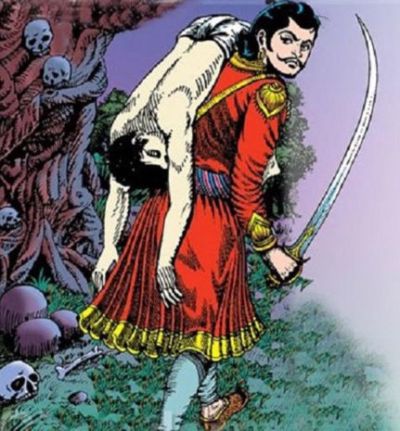Read the previous part here…
“Well, if you feel disgusted to touch it, why won’t we feel the same?”
“But you too should carry this turtle, and fast. Else the muhurt for the sacrifice will pass! If that happens, you both and our father will surely go to naraka (hell)”, said the eldest.

इत्य् उक्ताव् अनुजौ तेन तौ विहस्य तम् ऊचतुः ।
धर्मं वेत्स्य् आवयोर् एव समानम् अपि नात्मनः ॥ १२,१५.१० ॥
ततो ज्येष्ठो ऽब्रवीत् किं मे जानीथो नैव चङ्गताम् ।
अहं भोजनचङ्गो ऽस्मि नार्हः स्प्रष्टुं जुगुप्सितम् ॥ १२,१५.११ ॥
एतत् तस्य वचः श्रुत्वा भ्रातरं मध्यमो ऽब्रवीत् ।
अहं तर्ह्य् अधिकश् चङ्गो नारीचङ्गो विचक्षणः ॥ १२,१५.१२ ॥
मध्यमेनैवम् उक्ते तु ज्यायान् पुन उवाच सः ।
कूर्मं गृह्णातु तर्ह्य् एष कनीयान् आवयोर् इति ॥ १२,१५.१३ ॥
ततः स भ्रुकुटिं कृत्वा कनीयान् अप्य् उवाच तौ ।
हे मूर्खौ तूलिकाचङ्गश् चङ्गो ऽहं हि विशेषतः ॥ १२,१५.१४ ॥
एवं ते कलहासक्तास् त्रयो ऽपि भ्रातरो मिथः ।
निर्णयायाभिमानैकग्रस्ताः कूर्मं विहाय तम् ॥ १२,१५.१५ ॥
राज्ञः प्रसेनजिन्नाम्नस् तत्प्रदेशभुवो ऽन्तिकम् ।
नगरं सहसा जग्मुर् विटङ्कपुरनामकम् ॥ १२,१५.१६ ॥
तत्र प्रतीहारमुखेनावेद्यान्तः प्रविश्य च ।
नृपं विज्ञापयामासुः स्ववृत्तान्तं तथैव ते ॥ १२,१५.१७ ॥
तिष्ठतेहैव यावद् वः परीक्षिष्ये क्रमाद् अहम् ।
इत्य् उक्तस् तेन राज्ञा च तस्थुस् तत्र तथेति ते ॥ १२,१५.१८ ॥
स्वाहारकाले चानाय्य तेभ्यः सो ऽग्रासनं नृपः ।
राजार्हं दापयामास षड्रसं स्वादुभोजनम् ॥ १२,१५.१९ ॥
भुञ्जानेषु च सर्वेषु तदैको बुभुजे न सः ।
विप्रो भोजनचङ्गो ऽत्र जुगुप्साकूणिताननः ॥ १२,१५.२० ॥
कथं न भोजनं भुङ्क्ते ब्रह्मन् स्वादु सुगन्ध्य् अपि ।
इति रज्ञा स्वयं पृष्टः शनैर् विप्रो जगाद सः ॥ १२,१५.२१ ॥
The younger ones were amused. “If you know our duties so well, why don’t you recognize your duty to be the same?”
The eldest replied…
“Don’t you know how sensitive I am about food? I cannot be expected to touch something as repulsive as this!”
The second brother responded….
“Don’t you both know how sensitive and particular I am when it comes to women? I cannot possibly touch this, and then touch a woman ever again.”
The elder one replied “In that case, let the youngest carry the turtle.”
“You both act as if you do not know me at all”, retorted the youngest. “I am most sensitive about how and where I sleep, and I cannot sleep with the stench of this turtle on my hand.”
And so the three started fighting with one another. Unable to resolve their differences, they left the turtle there on the shore and reached the court of King Prasenajit, the ruler of Viṭaṅkapura, where they felt that they would get justice.
The gatekeeper announced their presence, and the three brothers went into the court and in front of the king, where they narrated the incident that had led them to fight.
“Interesting!”, exclaimed the king. I will give you justice. But, I have to test you all first.” The three brothers agreed.
It was lunchtime, so the king ordered the best of food to be prepared in the royal kitchens, and when it was ready, sat them down to eat. Everyone heartily dug into the delicious food, but for the eldest brother, the one who was sensitive about food. He sat aloof, his face puckered up with disgust.
शवधूमदुरामोदः शालिभक्ते ऽत्र विद्यते ।
तेन नाहम् इदं भोक्तुम् उत्सहे स्वाद्व् अपि प्रभो ॥ १२,१५.२२ ॥
इत्य् उक्ते तेन सर्वे ऽपि तत्राघ्राय नृपाज्ञया ।
ऊचुः कलमशाल्यन्नम् अदोषं तत् सुगन्धि च ॥ १२,१५.२३ ॥
स तु भोजनचङ्गस् तन् नाश्नात् पिहितनासिकः ।
ततः स राजा संचिन्त्य यावद् अन्विष्यति क्रमात् ॥ १२,१५.२४ ॥
तावन् नियोगिजनतस् तद् अन्नं बुबुधे तथा ।
ग्रामश्मशाननिकटक्षेत्रसंभवशालिजम् ॥ १२,१५.२५ ॥
ततो ऽतिविस्मितस् तुष्टः स राजा तम् अभाषत ।
सत्यं भोजनचङ्गस् त्वं तदन्यद्भुज्यताम् इति ॥ १२,१५.२६ ॥
कृताहारश् च स नृपो विप्रान् वासगृहेषु तान् ।
विसृज्यानाययामास स्वम् एकां गणिकोत्तमाम् ॥ १२,१५.२७ ॥
तां च तस्मै द्वितीयस्मै प्राहिणोत् कृतमण्डनाम् ।
विप्राय नारिचङ्गाय सायं सर्वाङ्गसुन्दरीम् ॥ १२,१५.२८ ॥
सा च वासगृहं तस्य राजभृत्यान्विता ययौ ।
राकानिशेव पुर्णेन्दुमुखी कंदर्पदीपिनी ॥ १२,१५.२९ ॥
प्रविष्टायां च तस्यां स प्रभाभासितवेश्मनि ।
उत्पन्नमूर्च्छः संरुद्धनासाग्रो वामपाणिना ॥ १२,१५.३० ॥
The king was intrigued at his behavior. “This food has been prepared by the best cooks in the kingdom”, he said. ” Then why are you not eating it?”
“This rice smells of the reek from corpses, and so I cannot bring myself to touch it, however delicious the food may be”, came the response.
Everyone was taken aback, and started to smell the rice. “There is no such smell!” they cried out. The consensus was, that this was the finest rice in the kingdom, and very fragrant, far from the smell of a rotting corpse.
But the Brahmin would not relent. “This smells of corpses”, he repeated. ” And I will not eat it.”
The king decided to investigate. Upon enquiring about the details, they found out that the rice had been grown in a field near a cremation ghāt of a certain village.
“Sadhu, Sadhu!”, exclaimed the king. “You truly are very sensitive to food! Please accept our apologies. We will make food for you separately, and hope it will satisfy you this time…”
After they all had finished their dinner, the three brothers retired to the guest quarters in the royal palace. He then sent across the the room of the second brother, the most beautiful dancer in his royal court. She had been dressed particularly well, and her ornaments accentuated her beautiful face, that shone like the full moon at midnight. Two of the king’s servants escorted her, as she walked in to the room, filling it with her fragrant presence, as the moonlight fills a dark night.
The second brother…
to be continued…
